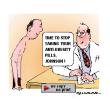 (HealthDay News) -- Obese teens who start a regular exercise program can reverse or reduce early signs of heart disease, new research shows.
(HealthDay News) -- Obese teens who start a regular exercise program can reverse or reduce early signs of heart disease, new research shows.The finding suggests that continued exercise could decrease their risk of developing hardening of the arteries, heart attacks and strokes, said Dr. Andreas Alexander Meyer, of the University of Rostock in Germany.
"Obese young adults who were already obese in childhood have a high risk of developing serious cardiovascular events," Meyer said. "First events can occur between the age of 20 and 30 years."
Meyer's team studied 67 obese German teens with early signs of hardening of the arteries: decreased flexibility of their arteries and increased thickness in the linings of the carotid arteries of the neck.
"It was in the range we usually see in adults between the ages of 30 and 40," Meyer said. "This is clear evidence of vascular changes in obese children."
During the study, the researchers randomly assigned the teens, who averaged 15 years of age, to either a six-month exercise program or no change in their usual routine.
The exercise regimen included 60 minutes of swimming and water aerobics on Mondays, 90 minutes of team sports on Wednesdays and 60 minutes of walking on Fridays.
In the exercise group, the researchers saw an almost complete restoration of the arteries' flexibility, which resulted in improved blood flow. They also observed a significant reduction in the thickness of the linings of the youths' carotid arteries.
Because exercise also led to improvements in body-mass index (BMI), blood pressure, and cholesterol and triglyceride levels, the researchers concluded that it could significantly reduce the teens' risk of developing heart disease. "Even children who did not lose weight showed improvements in vascular status and obesity-related risk factors," Meyer said.
The study results are published in the Nov. 7 issue of the Journal of the American College of Cardiology.
Meyer cautioned that these benefits would quickly vanish if the teens did not maintain their healthy new lifestyle and strive to become even more physically active. "Generally, in children, we recommend moderate exercise of 45-90 minutes per day to keep cardiovascular risk low," he said.
Parental support is essential, Meyer said, but it can be difficult to convince parents -- who may themselves be obese and sedentary -- that their children's lives depend on eating right and exercising regularly.
"Most obese children don't get sufficient support in their efforts to reduce weight," Meyer said. "We have intensive talks with the parents about their children's medical and vascular status. We try to make clear that the whole family needs to change its risky behavior."
In recent years, childhood obesity has become a worldwide epidemic, affecting an estimated 22 million children under age 5. In the United States, one-third of children are either obese or at risk of becoming obese, according to a 2006 federal report, Progress in Preventing Childhood Obesity: How Do We Measure Up?.
Between 2002 and 2004, the obesity rate for American children and teens increased from 16 percent to 17.1 percent and is expected to reach 20 percent by 2010, according to the report.
"All children and adolescents should engage in at least 60 minutes of physical activity on most, preferably all, days of the week," said Karen A. Donato, coordinator of the National Heart, Lung and Blood Institute's Obesity Education Initiative. She was not part of the study.
"According to the U.S. dietary guidelines for Americans, regular physical activity has been shown to reduce the risk of certain chronic diseases, including high blood pressure, stroke, coronary artery disease and type 2 diabetes," Donato said. "The National Institutes of Health has begun a national education program entitled We Can! (Ways to Enhance Children's Activity and Nutrition) to provide parents and primary caregivers of children with important information and tips on ways to increase physical activity in children and youth, as well as to decrease screen time, and eat a nutritious diet."
More information
For more on childhood obesity, head to the U.S. Centers for Disease Control and Prevention.

No comments:
Post a Comment